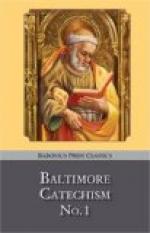41. Q. Did God give any command to Adam and Eve? A. To try their obedience God commanded Adam and Eve not to eat of a certain fruit which grew in the garden of Paradise.
42. Q. Which were the chief blessings intended for Adam and Eve had they remained faithful to God? A. The chief blessings intended for Adam and Eve, had they remained faithful to God, were a constant state of happiness in this life and everlasting glory in the next.
43. Q. Did Adam and Eve remain faithful to God? A. Adam and Eve did not remain faithful to God; but broke His command by eating the forbidden fruit.
44. Q. What befell Adam and Eve on account of their sin? A. Adam and Eve, on account of their sin, lost innocence and holiness, and were doomed to sickness and death.
45. Q. What evil befell us on account of the disobedience of our first parents? A. On account of the disobedience of our first parents, we all share in their sin and punishment, as we should have shared in their happiness if they had remained faithful.
46. Q. What other effects followed from the sin of our first parents? A. Our nature was corrupted by the sin of our first parents, which darkened our understanding, weakened our will, and left in us a strong inclination to evil.
47. Q. What is the sin called which we inherit from our first parents? A. The sin which we inherit from our first parents is called original sin.
48. Q. Why is this sin called original? A. This sin is called original because it comes down to us from our first parents, and we are brought into the world with its guilt on our soul.
49. Q. Does this corruption of our nature remain in us after original sin is forgiven? A. This corruption of our nature and other punishments remain in us after original sin is forgiven.
50. Q. Was any one ever preserved from original sin? A. The Blessed Virgin Mary, through the merits of her Divine Son, was preserved free from the guilt of original sin, and this privilege is called her Immaculate Conception.
LESSON SIXTH ON SIN AND ITS KINDS
51. Q. Is original sin the only kind of sin? A. Original sin is not the only kind of sin; there is another kind of sin, which we commit ourselves, called actual sin.
52. Q. What is actual sin? A. Actual sin is any wilful thought, word, deed, or omission contrary to the law of God.
53. Q. How many kinds of actual sin are there? A. There are two kinds of actual sin—mortal and venial.
54. Q. What is mortal sin? A. Mortal sin is a grievous offense against the law of God.
55. Q. Why is this sin called mortal? A. This sin is called mortal because it deprives us of spiritual life, which is sanctifying grace, and brings everlasting death and damnation on the soul.
56. Q. How many things are necessary to make a sin mortal? A. To make a sin mortal three things are necessary: a grievous matter, sufficient reflection, and full consent of the will.




